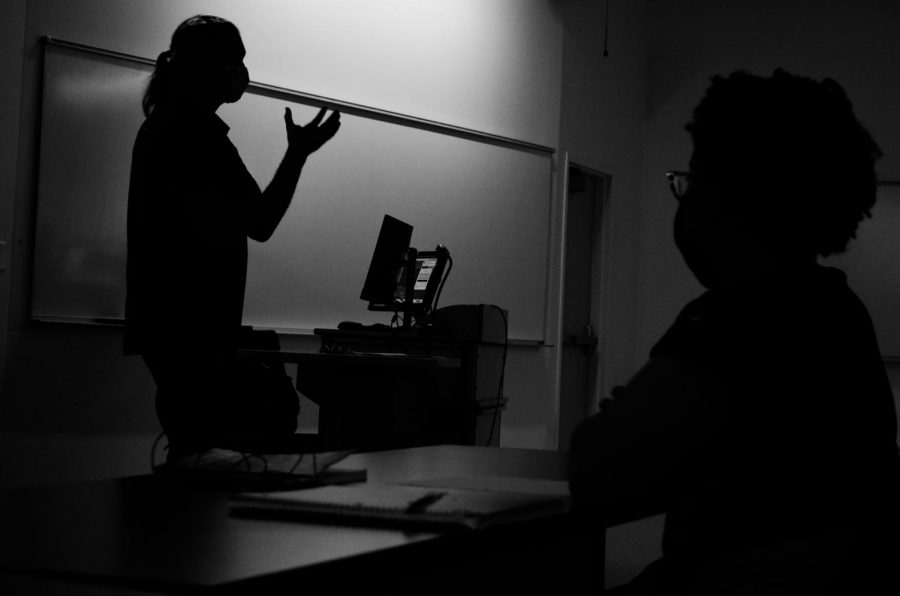Opinion: Tenure directly benefits students
Nathan Henne teaches class in Monroe Hall on March 30, 2021. Henne said that tenure helps him to enrich his students’ experiences in his classes. Photo credit: Gabrielle Korein
April 9, 2021
The tenure system at Loyola directly benefits students. Here’s how: the classes that tenured professors teach incorporate the most current knowledge in their fields — because those professors are expected to participate actively in the production of that knowledge in their time outside the classroom. Tenured and tenure-track professors can (and must, in fact) undertake ongoing research, discuss emerging ideas with their peers at academic conferences, and publish work that furthers the knowledge in their fields.
Professors can do research because their teaching schedules afford them just enough time to actively engage with those other scholars in their fields of expertise and publish cutting-edge ideas. Then, professors bring that dialogue directly into the classroom and continue the conversation with their students, whose responses and questions then inevitably affect how the professor steers the next phase of the research. This feedback loop is crucial for developing scholarship that answers to the perspectives and critical thinking of students.
My students fundamentally shape the questions I set out to try to answer in my field research even if they don’t always realize it. Some students might think they are just earning participation points toward their grades. They are, in fact, engaging in the production of cutting-edge knowledge through the process of scholarly dialogue. This active engagement by our students is the definition of critical pedagogy and it’s a staple of the Jesuit tradition.
Let me give you a specific example. My book that came out last year, “Reading Popol Wuj: A decolonial guide,” grew directly out of a class on Indigenous Literatures I have taught at Loyola over the years. I have been able to try out some developing arguments from Maya K’iche’ (in Guatemala) people’s worldviews in this class. Then, based on the discussions students and I have in those classes, I go back into the K’iche’ communities where I do my fieldwork and ask my collaborators about the particular philosophical rationale and implications of Indigenous knowledge my students have pressed me about.
I’m teaching that course again this semester, and, as I prepare for my next project, my students are showing me where that next phase of research can most directly impact the ways they’re thinking about the world. In this case, they’re clearly looking for alternative solutions that can uproot the colonial thinking underlying two main issues: gender / racial identities; and the climate crisis. I need my students’ unique, multi-disciplinary perspectives to help me shape the next set of questions.
Our contingent (non-tenure) faculty colleagues are certainly intellectually capable of participating in this important research and teaching loop. Some of these faculty even manage to squeeze in meaningful research between their overloaded teaching schedules—overloaded because teaching is the only thing administration pays most contingent faculty to do and that’s all their schedules reasonably give them time to do. No matter their intellectual capabilities and training, as long as they’re contingent faculty, they simply don’t have the time or support they need to participate in scholarly communities like tenured and tenure-track faculty.
Most contingent faculty generally can’t participate in collaborative research with students, either; they also can’t regularly direct independent studies, capstone projects, or Honors theses. The administration does not (and cannot) expect contingent faculty to engage these important, student-centered research activities.
Yet, the numbers of tenured faculty continue to decline, especially in some departments (like my department, Languages and Cultures) in the College of Arts and Sciences, which is the heart of any liberal arts university—particularly a Jesuit one (St. Ignatius himself spoke several languages and insisted on a deep and critical understanding of multiple languages as a foundation for Jesuit education.) That means that more and more people who are teaching your classes are not given time and support to stay current with the developments in their fields and they are not as able, through no fault of their own, to help prepare you optimally for careers in today’s fast-shifting labor market or to engage with you in collaborative research and/or experiential learning opportunities.
The more volatile the job market, the more important the feedback loop of research and teaching becomes for students’ success both at Loyola and beyond.







